(仁爱版)英语七年级下册各单元知识点归纳
仁爱版七年级下册英语7~8单元知识点总结

仁爱版七年级下册英语7~8单元知识点总结Unit 7 Topic 1重点句型—Were you born inHebei?Yes, I was./ No, I wasn’t.—When was your daughter born?—She was born on October 22nd, 1996.—Whenis your birthday? May 13th—What sthe shape of your present?It’s acircle./ rectangle / triangle/square.—What’sit like ? It’s like a star.—Howlong/wide is it?—Whatdo we use it for?We use it to study English.重点词组及短语talk about 谈论place of birth 出生地date of birth 出生日期after class 下课big fan 狂热粉丝have a birthday party 举行生日聚会have a look 看make a cake 做蛋糕do some cleaning 打扫cook a big dinner 做一顿丰盛的晚餐重点讲解1 英语中日期可以有两种表达法:(1)月日,年。
May 1st,2008(2)日月,年。
1stMay,20082 plan to do sth.计划做某事3 基数词变序数词的规律:基变序,有规律;一、二、三,特殊记;从四起,th; 八去t来九去e; ve要用f替。
整十该y为ie,后面再跟th;几十几和几百几,只变个位就可以。
4 介词in,on, at 在时间前面的应用1)在上下午、傍晚用inin the morningin the afternoonin the evening2)在季节、年、月前用in,inspring/summer/fall/winterin 2002, inJuly, in February, 20013)在具体的某一天及某一天的上下午、晚上用on 。
七年级英语仁爱版下册知识点总结topic1.
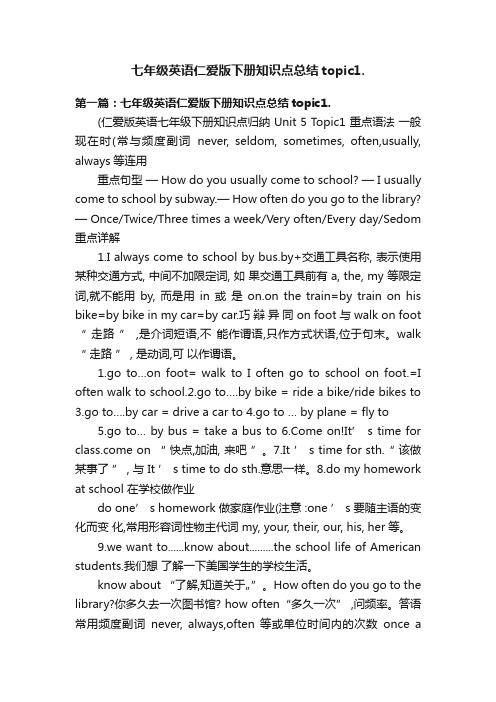
七年级英语仁爱版下册知识点总结topic1.第一篇:七年级英语仁爱版下册知识点总结topic1.(仁爱版英语七年级下册知识点归纳 Unit 5 Topic1 重点语法一般现在时(常与频度副词never, seldom, sometimes, often,usually, always等连用重点句型— How do you usually come to school? — I usually come to school by subway.— How often do you go to the library? — Once/Twice/Three times a week/Very often/Every day/Sedom 重点详解1.I always come to school by bus.by+交通工具名称, 表示使用某种交通方式, 中间不加限定词, 如果交通工具前有 a, the, my 等限定词,就不能用by, 而是用in 或是on.on the train=by train on his bike=by bike in my car=by car.巧辩异同 on foot 与 walk on foot “ 走路” ,是介词短语,不能作谓语,只作方式状语,位于句末。
walk “ 走路” , 是动词,可以作谓语。
1.go to…on foot= walk to I often go to school on foot.=I often walk to s chool.2.go to….by bike = ride a bike/ride bikes to3.go to….by car = drive a car to4.go to … by plane = fly to5.go to… by bus = take a bus toe on!It’ s time for e on “ 快点,加油, 来吧”。
仁爱英语七年级下册知识点总结

七年级下册知识点总结Unit 5 Topic1重点短语on foot go …on foot = walk ( to )…at the school gate在学校大门口on weekdays 在平日 ,在工作日on weekends=on the weekend在周末after school 放学后after class 下课后after breakfast / lunch / supper早餐/ 午餐/ 晚餐后in ones free time在某人空闲时间have a rest 休息一下read books 读书go swimming 去游泳listen to music 听音乐watch TV 看电视do(one’s)homework 做作业go to the zoo / park 去动物园/ 公园once a week 一周一次every day 每天have classes 上课for a little while 一会儿go to bed 上床睡觉come on 快点,加油,来吧get up 起床talk with / to sb.与某人谈话at school 在学校、在上课go to school 去上学and so on ……等等重点句型Happy New Year! The same to you.Your new bike looks very nice. Thank you.How do you usually come to school? —I usually come to school by subway.How often do you go to the library?—Once/Twice/Three times a week/Very often/Every day/SedomThe early bird catches the work. (谚语) 笨鸟先飞Work / Study must come first. 工作/ 学习必须放在第一位!Classes begin at eight. =Class begins at eight.What time does the class begin? / What time do the classes begin?We have no more time. 我们没有更多的时间了。
仁爱版英语七年级下册各单元知识点汇总

仁爱版七年级英语下册各单元重点短语、句型、话题作文梳理Unit5 Topic1知识梳理【重点短语】:1. on foot 步行 go …on foot = walk ( to )…2. at the school gate 在学校大门口3. on weekdays 在平日,在工作日4. on weekends=on the weekend 在周末5. after school 放学后6. after class 下课后7. after breakfast / lunch / supper早餐 / 午餐 / 晚餐后8. in one's free time 在某人空闲时间9. have a rest 休息一下10. read books 读书11. go swimming 去游泳12. listen to music 听音乐13. watch TV 看电视14. do(one’s) homework 做作业15. go to the zoo / park 去动物园 / 公园16. once a week 一周一次17. every day 每天18. have classes 上课19. for a little while 一会儿20. go to bed 上床睡觉21. come on 快点,加油,来吧22. get up 起床23. talk with / to sb.与某人谈话24. at school 在学校、在上课25. go to school 去上学26. and so on ……等等【重点句型】:1. --Happy New Year!--The same to you.2. --Your new bike looks very nice.--Thank you.3. --How do you usually come to school?--I usually come to school by subway.4. --How often do you go to the library?--Once/Twice/Three times a week/Very often/Every day/Sedom6. The early bird catches the worm. (谚语) 笨鸟先飞7. Work / Study must come first.工作/ 学习必须放在第一位!8. Classes begin at eight. =Class begins at eight.9. What time does the class begin?What time do the classes begin?10. We have no more time. 我们没有更多的时间了。
(完整版)仁爱版七年级英语下册知识点总结
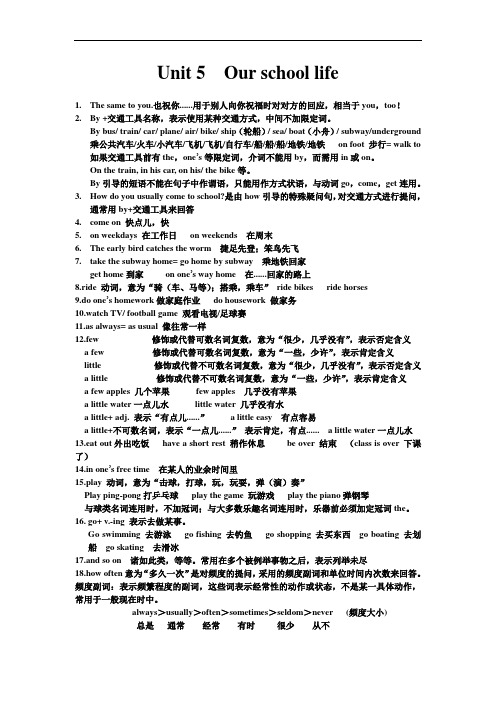
Unit 5 Our school life1.The same to you.也祝你......用于别人向你祝福时对对方的回应,相当于you,too!2.By +交通工具名称,表示使用某种交通方式,中间不加限定词。
By bus/ train/ car/ plane/ air/ bike/ ship(轮船)/ sea/ boat(小舟)/ subway/underground 乘公共汽车/火车/小汽车/飞机/飞机/自行车/船/船/船/地铁/地铁on foot 步行= walk to 如果交通工具前有the,one’s等限定词,介词不能用by,而需用in或on。
On the train, in his car, on his/ the bike等。
By引导的短语不能在句子中作谓语,只能用作方式状语,与动词go,come,get连用。
3.How do you usually come to school?是由how引导的特殊疑问句,对交通方式进行提问,通常用by+交通工具来回答e on 快点儿,快5.on weekdays 在工作日on weekends 在周末6.The early bird catches the worm 捷足先登;笨鸟先飞7.take the subway home= go home by subway 乘地铁回家get home到家on one’s way home 在......回家的路上8.ride 动词,意为“骑(车、马等);搭乘,乘车”ride bikes ride horses9.do one’s homework做家庭作业do housework 做家务10.watch TV/ football game 观看电视/足球赛11.as always= as usual 像往常一样12.few 修饰或代替可数名词复数,意为“很少,几乎没有”,表示否定含义a few 修饰或代替可数名词复数,意为“一些,少许”,表示肯定含义little 修饰或代替不可数名词复数,意为“很少,几乎没有”,表示否定含义a little 修饰或代替不可数名词复数,意为“一些,少许”,表示肯定含义a few apples 几个苹果few apples 几乎没有苹果a little water一点儿水little water 几乎没有水a little+ adj. 表示“有点儿......” a little easy 有点容易a little+不可数名词,表示“一点儿......”表示肯定,有点...... a little water一点儿水13.eat out外出吃饭have a short rest 稍作休息be over 结束(class is over 下课了)14.in one’s free time 在某人的业余时间里15.play 动词,意为“击球,打球,玩,玩耍,弹(演)奏”Play ping-pong打乒乓球play the game 玩游戏play the piano弹钢琴与球类名词连用时,不加冠词;与大多数乐趣名词连用时,乐器前必须加定冠词the。
仁爱版七年级下英语各单元知识点总结

七年级下英语知识点总结Unit 5 Topic1㈠短语总结1. 在学校大门口 at the school gate2. 来学校 come to school3. 去学校 go to school4. 上课 have class / have classes5. 步行 on foot6. 骑自行车 ride a bike/ ride bikes/ by bike / on a bike7. 坐公交 by bus / take a bus8. 坐地铁 by subway / take the subway / on the subway 9. 坐飞机 by plane/ take the plane / on the plane 10. 坐小汽车 by car / in a car/ take a car/ drive a car 11. 坐轮船 by ship 12. 坐小船 by boat13. 坐火车 by train / on the train 14. 在我们组 in our group15. 一群学生 a group of students 16. 我们中的三个人 three of us 17. 在平日 on weekdays18. 在周末 on the weekends / at weekends 19. 起床 get up 20. 睡觉 go to bed 21. 早起 get up early 22. 回家 go home 23. 到家 get home24. 去动物园 go to the zoo 25. 去公园 go to the park 26. 看电影 see a movie / film 27. 看电视 watch TV28. 在晚上 in the evening / at night 29. 援助父母 help parents30. 做某人的家庭作业 do one‘s ( my/ her/ his/ your/ their) homework 31. 在学校 at school32. 了解,了解 know about / learn about 33. 校园生活 school life34. 一个美国学生 an American student 35. 在美国 in America / in the U.S.A.36. 许多学生 many students/ a lot of students/ lots of students 37. 很少 very few 38. 吃午饭 have lunch 39. 出去吃饭 eat out40. 在校期间 on school days41. 休息一会 have a short rest / break 42. 午饭后 after lunch43. 在某人的业余时间in one‘s ( my/ his/ her/ their…)free/ spare time 44. 打篮球 play basketball 45. 踢足球play soccer / football 46. 弹钢琴 play the piano 47. 弹吉他play the guitar 48. 拉二胡 play erhu49. 去游泳 go swimming / go for a swim 50. 去划船 go boating51. 球赛 a ball game / ball games 52. 一年四次 four times a year 53. 听音乐 listen to music 54. 读书 read books55. 看报 read newspapers 56. 看医生 see a doctor57. 去图书馆 go to the library 58. 一周两次 twice a week 59. 见朋友 meet friends 60. 每天 every day61. 在七点半 at half past seven62. 一小会 for a little while / for a short time 63. 晚饭后 after supper 64. 吃饭 have dinner65. 吃早饭 have breakfast重点句型Happy New Year! The same to you.Your new bike looks very nice. Thank you.How do you usually come to school? —I usually come to school by subway. How often do you go to the library? —Once/Twice/Three times a week/Very often/Every day/Sedom The early bird catches the work. (谚语) 笨鸟先飞Work / Study must come first. 工作/ 学习必须放在第一位! Classes begin at eight. =Class begins at eight.What time does the class begin? / What time do the classes begin? We have no more time. 我们没有更多的时间了。
(仁爱版)英语七年级下册知识点归纳与总结
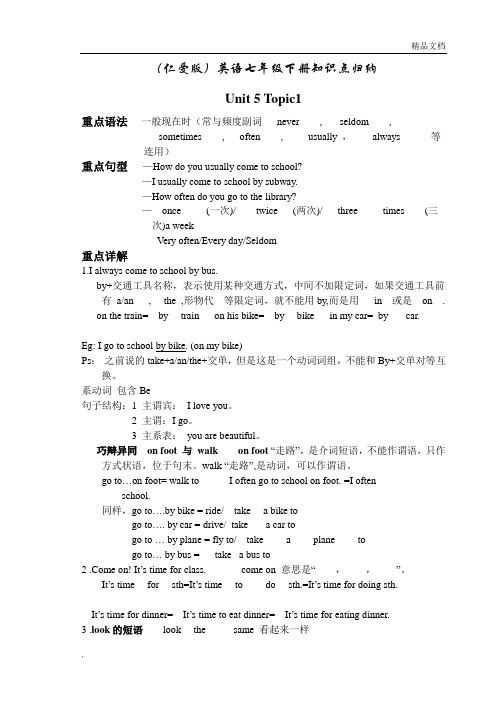
(仁爱版)英语七年级下册知识点归纳Unit 5 Topic1重点语法一般现在时(常与频度副词___never____, ___seldom____,___sometimes____,___often____, ___usually_,____always______等连用)重点句型—How do you usually come to school?—I usually come to school by subway.—How often do you go to the library?—__once_____(一次)/____twice___(两次)/___three ___times____(三次)a weekVery often/Every day/Seldom重点详解1.I always come to school by bus.by+交通工具名称,表示使用某种交通方式,中间不加限定词,如果交通工具前有_a/an___, __the_,形物代_ 等限定词,就不能用by,而是用___in__或是__on__.on the train=__by__ train on his bike=__by__ bike in my car=_by___ car.Eg: I go to school by bike. (on my bike)Ps:之前说的take+a/an/the+交单,但是这是一个动词词组,不能和By+交单对等互换。
系动词包含Be句子结构:1 主谓宾:I love you。
2 主谓:I go。
3 主系表:you are beautiful。
巧辩异同on foot 与walk on foot “走路”,是介词短语,不能作谓语,只作方式状语,位于句末。
walk “走路”,是动词,可以作谓语。
go to…on foot= walk to I often go to school on foot. =I often ________school.同样,go to….by bike = ride/__take__ a bike togo to…. by car = drive/_take___ a car togo to … by plane = fly to/__take__ __a__ __plane__ __to__go to… by bus =___take_ a bus to2 .Come on! It’s time for class. come on 意思是“____,____,____”。
仁爱版英语七年级下全部知识点总结
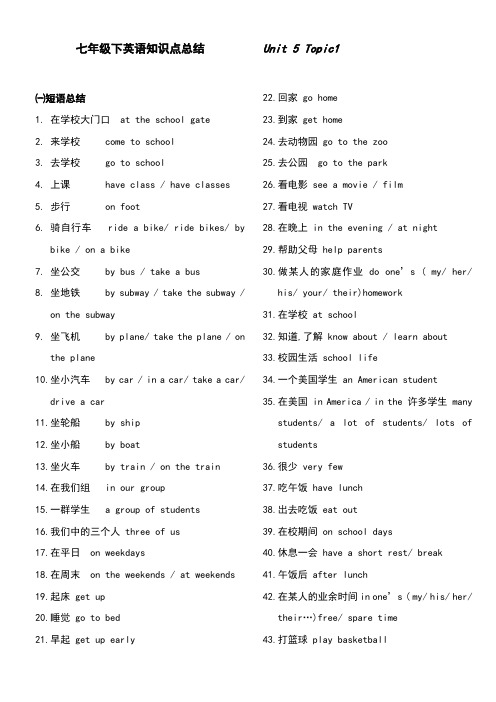
七年级下英语知识点总结Unit 5 Topic1㈠短语总结1.在学校大门口 at the school gate2.来学校 come to school3.去学校 go to school4.上课 have class / have classes5.步行 on foot6.骑自行车 ride a bike/ ride bikes/ bybike / on a bike7.坐公交 by bus / take a bus8.坐地铁 by subway / take the subway /on the subway9.坐飞机 by plane/ take the plane / onthe plane10.坐小汽车 by car / in a car/ take a car/drive a car11.坐轮船 by ship12.坐小船 by boat13.坐火车 by train / on the train14.在我们组 in our group15.一群学生 a group of students16.我们中的三个人 three of us17.在平日 on weekdays18.在周末 on the weekends / at weekends19.起床 get up20.睡觉 go to bed21.早起 get up early 22.回家 go home23.到家 get home24.去动物园 go to the zoo25.去公园 go to the park26.看电影 see a movie / film27.看电视 watch TV28.在晚上 in the evening / at night29.帮助父母 help parents30.做某人的家庭作业 do one’s ( my/ her/his/ your/ their)homework31.在学校 at school32.知道,了解 know about / learn about33.校园生活 school life34.一个美国学生 an American student35.在美国 in America / in the 许多学生 manystudents/ a lot of students/ lots of students36.很少 very few37.吃午饭 have lunch38.出去吃饭 eat out39.在校期间 on school days40.休息一会 have a short rest/ break41.午饭后 after lunch42.在某人的业余时间in one’s ( my/ his/ her/their…)free/ spare time43.打篮球 play basketball44.踢足球play soccer / football45.弹钢琴 play the piano46.弹吉他play the guitar47.拉二胡 play erhu48.去游泳 go swimming / go for a swim49.去划船 go boating50.球赛 a ball game / ball games51.一年四次 four times a year52.听音乐 listen to music53.读书 read books54.看报 read newspapers 55.看医生 see a doctor56.去图书馆 go to the library57.一周两次 twice a week58.见朋友 meet friends59.每天 every day60.在七点半 at half past seven61.一小会 for a little while / for a shorttime62.晚饭后 after supper63.吃饭 have dinner64.吃早饭 have breakfast㈡重要句型1.I usually come to school by subway.同义句: I usually take the subway to school.对划线部分提问: How do you usually come to school类似的有:go to school by bike=go to schoolon a bike= ride a bike to school=ride to schoolgo home by bus=go home on a bus=take a bus home2.How do you usually/ often…你通常/经常怎样…3.It’s time for class.=It’s time to haveclass. =It’s time for having class.4.What about you =How about you5.How often …询问频率,回答可以用频率副词:always, usually, often, sometimes, seldom, never, every day ,every +其他时间名词或表示频率的短语回答表示频率的短语:次数+单位时间. : once a day / twice a week / three timesa month6. The early bird catches the work. (谚语) 笨鸟先飞7. Work / Study must come first. 工作/ 学习必须放在第一位!8. Classes begin at eight. =Class begins at eight.提问: What time does the class begin / What time do the classes begin㈢重要单词的用法1.look (感官动词) 看起来,后面加形容词His mother looks very young.They look very cute.Her dress looks very nice.You look very cool in this coat.2.by 介词by 后面直接加表示交通工具的名词,中间不用任何词修饰,如:by bikeby +动词ing形式,表示通过某种方式People show love to their mothers by giving cards.You can be a good student by working hard.3.over (形容词)School / Class is over.4.begin现在分词: beginning 过去式: beganbegin to do sth , begin doing sthHe begins to write a letter. =He begins writing a letter.如果begin本身为分词,只能用begin to do sthHe is beginning to run.5.listen to 听(动作), hear 听见(结果)6.always 反义词 never7.本话题涉及的时态为一般现在时,句中常有频率副词或表示频率的短语,如果主语为三单,动词一定要用三单!(四)易错题1.You new watch ______ (look) very nice!2.Here ______(be) some news.3.Oh, come on! It’s time_____ going toschool.4.They usually go to school on________(feet).5.In my class, forty of _______(we) go toschool by bike.6.The early bird ______ (catch) the worm.7.Kangkang often _____ (ride) a bike to thepark.8.What time _____ (be)school over9.Work must come ______(once).10.It’s time ____you to get up.11.We often _____ books in the morning.12.Jill’s friend like ______(study) in ourschool.13.Mr. Wang teaches ______(we) English._____ of us like him.14.How about ______(go) out with me15.Most students go to school _____ theschool bus.16._______ do you go shopping with yourmotherA. How soonB. How farC. How oftenD. How much17.What time do you usually get up _____weekdays18.He ______ busy, so he has no time to playwith us.A. is alwaysB. seldom isC. always isD. often is19. The last class______(finish) at twelve o’clock.20. Let’s go______(boat).21. It’s time to have breakfast. (同义句) _________________________________________ _____________.22. Michael often rides a bike to school. (同义句)_________________________________________ _____________.23. I always go to work on foot. (对划线部分提问)_________________________________________ _____________.24. My mother goes shopping twice a week. (对划线部分提问)_________________________________________ _____________.25. Mary always reads books in the library. (反义句)_________________________________________ _____________.26. He usually does his homework at school. (否定句)_________________________________________ _____________.27. They often go to school by bus in the morning. (对划线部分提问)_________________________________________ _____________.28. Jane seldom watches TV on weekdays. (改为一般疑问句)_________________________________________ _____________.29. He usually has lunch at home. (对划线部分提问)_________________________________________ _____________.30. Li Ping often goes to work on foot. (同义句)_________________________________________ _____________.31. 几乎没有学生乘地铁去学校。
仁爱英语七年级下册知识点归纳

你什么的样子真美作文篇一:你坚守的样子真美“江山不负英雄泪,且将利剑破长空”在九百六十万平方公里的土地上,在祖国西部,在神秘的喀喇昆仑高原上,有一群人如雪莲般绽放,如松柏般挺拔,无时无刻不在守卫着祖国的疆土,他们就是——戍边战士。
“清澈的爱,只留给祖国。
”18岁的陈祥榕用生命热爱着祖国。
2020年6月面对公然来犯的印军的钢管、棍棒的攻击,陈祥榕突出重围,奋力反击,用身体死死地护住战友。
在战斗结束时才发现陈祥荣紧紧趴在营长的身上,他的生命也永远定格在了保护营长的那一刻。
十八岁的少年用略显青涩的面容和还没有足够力量的臂膀,守护住了他的祖国。
陈祥榕牺牲时,距离他边疆入伍不过半年时间,那个从海边来的少年永远留在了山的那边。
“宁将鲜血流尽,不失国土一寸。
”这句话深深地刻入了每一个边疆战士的心中。
我们享受祖国的富饶和强大时,他们用青春和热血坚守着。
战士王焯冉在和战友支援一线时,湍急的河流将部队冲散,在生与死的刹那间,王焯冉毅然将战士战友推上岸,把自己留在了刺骨的激流中。
无数戍边战士用军人的担当,在这片坚硬的土地上深深地扎下根,让国旗在这里高高飘扬。
他们朴实无华,他们只是千千万人民中的一员,但正是这样一群普普通通的人,用他们的生命捍卫祖国的边疆。
“勿忘国耻,兴我中华”,千千万万的战士用生命捍卫着祖国的主权和尊严,无数的医生护士用信念和死神赛跑,千万名建筑工人用双手建设祖国。
在新时代的今天,我们正以生命起誓,誓将祖国建设的更加强大富饶。
篇二:你孤独的样子真美你今天是一个孤独的怪人,你离群所居,总有一天,你会成就一个民族。
你于江边立足,如今虽为初夏,但岸边的兰枝草却已茂密,幽幽的绿色泛着冷意。
起风了。
岸边的冷意更甚,兰草伴着风,如浪涛般一层又一层翻滚。
白衣勾出了你细瘦的身影,撩起长发,面容枯败,只有你眼中依旧深不见底,而你的心底还留着尚未完全退去的热血与赤诚,你又何尝不愿去痛恨啊!恨怀王亲信小人,错将珷玞当美玉;恨这世上再无伯乐,无人赏识千里马;更恨如今奸臣当道,而你有心报国却报国无门。
仁爱版英语七年级下册知识点归纳(完整版)

仁爱版英语七年级下册知识点归纳(完整版)-CAL-FENGHAI-(2020YEAR-YICAI)_JINGBIAN仁爱版英语七年级下册知识点归纳?英语七年级下册知识点归纳Unit?5?Topic1?重点语法一般现在时(常与频度副词never,?seldom,?sometimes,?often ,usually,?always等连用)重点句型?—How?do?you?usually?come?to?school???—I?usually?come?to?school?by?subway.????????????—How?often?do?you?go?to?the?library????—Once/Twice/Three?times?a?week/Very?often/Every?day/Seldom重点详解1I?always?come?to?school?by?bus.???by+交通工具名称,表示使用某种交通方式,中间不加限定词,如果交通工具前有a,?the,?my?等限定词,就不能用by,而是用in或是on.???on?the?train=by?train???on?his?bike=by?bike???in?my?car=by?car.???巧辩异同on?foot?与?walk????on?foot?“走路”,是介词短语,不能作谓语,只作方式状语,位于句末。
??walk?“走路”,是动词,可以作谓语。
? ? ??go?to…on?foot=?walk?to? ? ???I?often?go?to?school?on?foot.?=I?often?walk?to?school.?????同样,go?to….by?bike?=?ride?a?bike?to?????? ? ? ? ? go?to….?by?car?=?drive?a?car?to????????? ??go?to?…?by?plane?=?fly?to????????? ? ? ? ? go?to…?by?bus?=?take?a?bus?to2???Come?on!?It’s?time?for?class.???????come?on?“快点,加油,来吧”。
仁爱英语_七年级下册知识点归纳

(仁爱版)英语七年级下册知识点归纳一,重点句子unit 51,how do you usually come to school? I usually come to school by subway. And I seldom walk to school. 2,What time do you usually get up on weekdays? I always get up at about six o’clock3,Where do they usually have lunch?they usually have lunch at school. They seldom eat out on school days. Do they have a short rest after lunch ?no,they don’t .what time is school over ? how often do they have ball game ?four times a year . nice talking to you .4,what are you doing ? I’m making cards , but it’s boring . would you like to play basketball? Good idea5,May I borrow a few books ? of course .many students are using them, and they are doing better in English now. here you are . great how long can I keep them ? two days,you must return them on time.6,what day is it today ?it’s Wednesday. What class are they having? They are having a music class. What time does the class begin ? at ten o’clock . how many history lessons do you have evey week? Which subject do you like best ?I like history best. What do you think ofunit一、重点词语:1. wake up 醒来,唤醒get up 起床2. go to school 去上学go home 回家3. go dancing / shopping / skating / swimming 去跳舞;购物、滑冰;游泳go doing something 可用于表达去进行某种娱乐休闲活动。
仁爱版初一下册英语知识点总结

【导语】下⾯是⽆忧考为您整理的仁爱版初⼀下册英语知识点总结,仅供⼤家查阅。
Unit 1 Can you play the guitar ?1、can+动词原形,它不随主语和数⽽变化。
(1)含有can的肯定句:主语+can+谓语动词的原形+其他。
(2)变⼀般疑问句时,把can提前:Can+主语+动词原形+其他?肯定回答:Yes,主语+can。
否定回答:No,主语+can't.(3)含有can的否定句:主语+can't+动词的原形+其他。
(4)含有can的特殊疑问句:特殊疑问词+can+主语+动词原形+其他?2、may+动词的原形。
(may为情态动词)⼀般疑问句是把may提前,肯定回答是:Yes,主语 +may。
否定回答是:No,主语+mustn't。
或please don't。
join+某个组织,俱乐部,party,参军,党派等 “加⼊”Join sb. “参加到某⼈中” join in (doing)sth “加⼊做......,参加某个活动” Join in=take part in +活动,⽐赛3、说某种语⾔:speak+语⾔4、play+球、棋、牌;play+the+乐器。
5、擅长于(做)什么:be good at +名词/动ing6、帮助某⼈做某事:help sb. (to ) do sth. help sb. with sth.7、我能知道你名字吗?May I know your name?8、想要做什么:want to do sth 例如:I want to learn about art.9、What club do you want to join?I want to join the chess club and the basketball club.10、What club does Tom want to join? He wants to join the swimming club .11、He can’t play the violin or the piano. Can you help kids with swimming?12、Why do you want to join the English club? Because I want to learn English well.Unit 2 What time do you go to school ?1、what time和when引导的特殊疑问句。
仁爱版英语七年级下册各单元知识点归纳
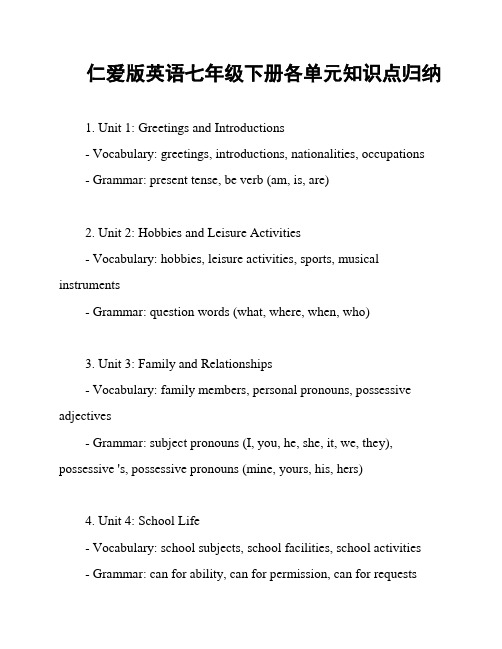
仁爱版英语七年级下册各单元知识点归纳1. Unit 1: Greetings and Introductions- Vocabulary: greetings, introductions, nationalities, occupations- Grammar: present tense, be verb (am, is, are)2. Unit 2: Hobbies and Leisure Activities- Vocabulary: hobbies, leisure activities, sports, musical instruments- Grammar: question words (what, where, when, who)3. Unit 3: Family and Relationships- Vocabulary: family members, personal pronouns, possessive adjectives- Grammar: subject pronouns (I, you, he, she, it, we, they), possessive 's, possessive pronouns (mine, yours, his, hers)4. Unit 4: School Life- Vocabulary: school subjects, school facilities, school activities- Grammar: can for ability, can for permission, can for requests5. Unit 5: Daily Routines- Vocabulary: daily activities, time expressions, adverbs of frequency- Grammar: simple present tense, adverbs of frequency (always, often, sometimes, never)6. Unit 6: Food and Drinks- Vocabulary: food items, drinks, restaurant vocabulary- Grammar: countable and uncountable nouns, quantifiers (some, any)7. Unit 7: Places and Directions- Vocabulary: places in town, prepositions of location, directions- Grammar: imperatives, there is/there are8. Unit 8: Transportation- Vocabulary: means of transportation, travel vocabulary- Grammar: past tense (regular and irregular verbs), past tense of be verb (was, were)以上是仁爱版英语七年级下册各单元的知识点归纳。
仁爱英语七年级下册知识点归纳总结

仁爱英语七年级下册知识点归纳总结那咱们开始!一、词汇。
1. 好多好多新单词等你认识呢,像“postcard”(明信片)、“hotel”(旅馆)、“bank”(银行),别弄混啦!2. 注意单词的词性哦,比如“swim”(动词:游泳),“swimming”(名词:游泳)。
3. 还有一些容易拼写错误的单词,像“favourite”(最喜欢的),可别少了字母“u”哟。
二、语法。
1. 一般现在时:这可是经常出现的“常客”,要注意主语是第三人称单数时动词的变化,比如“He likes apples.”(他喜欢苹果。
),“like”要加“s”。
2. 现在进行时:“be + doing”这个结构要记牢,“I'm reading a book.”(我正在读书。
),表示正在发生的动作。
3. 介词的用法:“in”“on”“at”可要分清,“in the morning”(在早上),“on the desk”(在桌子上),“at 8 o'clock”(在 8 点)。
三、句型。
1. 日常交际用语不能忘,比如“Nice to meet you.”(见到你很高兴。
),“How are you?”(你好吗?)2. 问路和指路的句型要学会,“Excuse me. Where is the post office?”(打扰一下,邮局在哪里?)“Go along this street and turn left.”(沿着这条街走然后左转。
)四、课文。
1. 多读课文,熟悉里面的句子和表达方式,这样才能更好地掌握知识点。
2. 注意课文中的语音语调,模仿着读,让你的英语更地道。
好啦,这就是仁爱英语七年级下册的主要知识点,加油学习,相信你一定能搞定!。
仁爱版英语七年级下册知识点归纳完整版

仁爱版英语七年级下册知识点归纳英语七年级下册知识点归纳Unit 5 Topicl重点语法一般现在时(常与频度副词never, seldom, sometimes, often ‘usually,always等连用)重点句型一How do you usually come to school—I usually come to school by subway.—How often do you go to the library—On ce/Twice/Three times a week/Very ofte n/Every day/Seldom重点详解1 I always come to school by bus.by+交通工具名称,表示使用某种交通方式,中间不加限定词,如果交通工具前有a, the, my等限定词,就不能用by,而是用in或是on.on the train=by train on his bike=by bike in my car=by car.巧辩异同on foot 与walkon foot“走路”,是介词短语,不能作谓语,只作方式状语,位于句末。
walk "走路”,是动词,可以作谓语。
go to •••on foot= walk toofte n go to school on foot. =I ofte n walk to school.同样,go to ….by bike =ride a bike togo to …. by cardrive a car to5 we want to know about the school life of American students. 我们想了解一下美国学生的学校生活。
know about“了解,知道关于…”。
6 巧辩异同a few 与fewa few“一些”,few “很少,几乎没有",修饰可数名词。
仁爱版英语七年级下册u7t1知识点
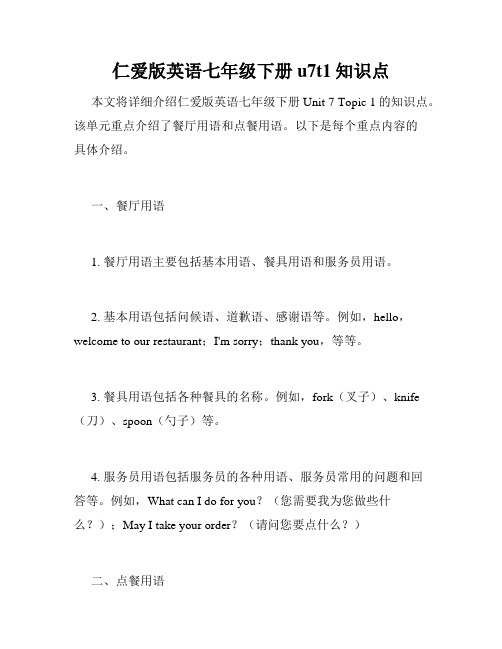
仁爱版英语七年级下册u7t1知识点本文将详细介绍仁爱版英语七年级下册Unit 7 Topic 1的知识点。
该单元重点介绍了餐厅用语和点餐用语。
以下是每个重点内容的
具体介绍。
一、餐厅用语
1. 餐厅用语主要包括基本用语、餐具用语和服务员用语。
2. 基本用语包括问候语、道歉语、感谢语等。
例如,hello,welcome to our restaurant;I'm sorry;thank you,等等。
3. 餐具用语包括各种餐具的名称。
例如,fork(叉子)、knife (刀)、spoon(勺子)等。
4. 服务员用语包括服务员的各种用语、服务员常用的问题和回
答等。
例如,What can I do for you?(您需要我为您做些什么?);May I take your order?(请问您要点什么?)
二、点餐用语
1. 点餐用语主要包括点餐流程和菜单翻译。
2. 点餐流程包括问询客人口味、点餐、确认菜单等。
例如,Could you please tell me your preference?(请问您喜欢什么口味?);I’d like to order...(我要点...);Is that all?(这些就够了吗?)
3. 菜单翻译包括菜名、酒水、套餐等的翻译。
例如,chicken salad(鸡肉沙拉);orange juice(橙汁);set menu(套餐)。
以上是仁爱版英语七年级下册Unit 7 Topic 1的知识点介绍。
希望本文对学习该单元的同学有所帮助,能够顺利掌握相关内容。
仁爱版英语七年级下册知识点复习归纳(完整版)

仁爱版英语七年级下册知识点归纳英语七年级下册知识点归纳Unit 5 Topic1重点语法一般现在时(常与频度副词never, seldom, sometimes, often ,usually, always等连用)重点句型—How do you usually come to school?—I usually come to school by subway.—How often do you go to the library?—Once/Twice/Three times a week/Very often/Every day/Seldom重点详解1I always come to school by bus.by+交通工具名称,表示使用某种交通方式,中间不加限定词,如果交通工具前有a, the, my 等限定词,就不能用by,而是用in或是on.on the train=by train on his bike=by bike in my car=by car.巧辩异同on foot 与walk on foot “走路”,是介词短语,不能作谓语,只作方式状语,位于句末。
walk “走路”,是动词,可以作谓语。
go to…on foot= walk toI often go to school on foot. =I often walk to school.同样,go to….by bike = ride a bike togo to…. by car = drive a car togo to … by plane = fly togo to… by bus = take a bus to2 Come on! It’s time for class. come on “快点,加油,来吧”。
It’s time for sth. “该做某事了”,与 It’s time to do sth.意思一样。
仁爱版七年级下册英语u6t1知识点
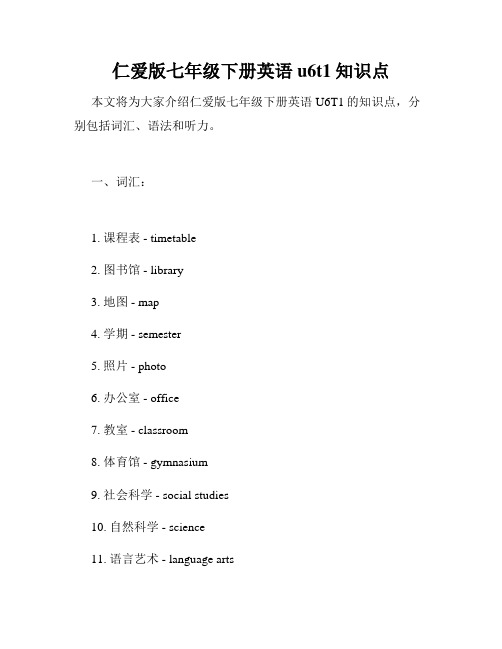
仁爱版七年级下册英语u6t1知识点本文将为大家介绍仁爱版七年级下册英语U6T1的知识点,分别包括词汇、语法和听力。
一、词汇:1. 课程表 - timetable2. 图书馆 - library3. 地图 - map4. 学期 - semester5. 照片 - photo6. 办公室 - office7. 教室 - classroom8. 体育馆 - gymnasium9. 社会科学 - social studies10. 自然科学 - science11. 语言艺术 - language arts12. 音乐 - music13. 美术 - art二、语法:1. 一般现在时 - Present Simple Tense一般现在时表示目前正在发生或经常发生的动作、状态或存在的事情,其句型结构为主语+谓语动词。
例如:I like playing basketball. 我喜欢打篮球。
My brother studies in a university now. 我哥哥现在在读大学。
The library opens at 9:00am every day. 图书馆每天早上9点开门。
2. 进行时 - Present Continuous Tense进行时表示正在进行的动作,其句型结构为主语+be动词(am/is/are)+现在分词。
例如:I am studying English now. 我正在学英语。
She is listening to music at the moment. 她现在正在听音乐。
The students are working on their group project. 学生们正在进行小组项目。
3. 句子结构英语中的句子主要包括主语、谓语、宾语、补语、定语和状语等。
其中,主语和谓语是英语句子的基本要素,它们构成了句子的基本骨架。
例如:My father (主语) works (谓语) in a hospital. 我的父亲在医院工作。
- 1、下载文档前请自行甄别文档内容的完整性,平台不提供额外的编辑、内容补充、找答案等附加服务。
- 2、"仅部分预览"的文档,不可在线预览部分如存在完整性等问题,可反馈申请退款(可完整预览的文档不适用该条件!)。
- 3、如文档侵犯您的权益,请联系客服反馈,我们会尽快为您处理(人工客服工作时间:9:00-18:30)。
(仁爱版)英语七年级下册各单元知识点归纳Unit 5 Topic1重点语法一般现在时(常与频度副词never, seldom, sometimes, often,usually, always等连用)重点句型—How do you usually come to school?—I usually come to school by subway.—How often do you go to the library?—Once/Twice/Three times a week/Very often/Every day/Sedom重点详解1.I always come to school by bus.by+交通工具名称,表示使用某种交通方式,中间不加限定词,如果交通工具前有a, the, my 等限定词,就不能用by,而是用in或是on.on the train=by train on his bike=by bike in my car=by car.巧辩异同on foot 与walk on foot “走路”,是介词短语,不能作谓语,只作方式状语,位于句末。
walk “走路”,是动词,可以作谓语。
go to…on foot= walk to I often go to school on foot. =I often walk to school.同样,go to….by bike = ride a bike to go to…. by car = drive a car to go to … by plane = fly to go to… by bus = take a bus to2 .Come on! It’s time for class. come on “快点,加油,来吧”。
It’s time for sth. “该做某事了”,与It’s time to do sth.意思一样。
3 .look的短语look the same看起来一样look like看起来像……look for寻找look after 照顾4 .do my homework at school 在学校做作业do one’s homework 做家庭作业(注意:one’s 要随主语的变化而变化,常用形容词性物主代词my, your, their, our, his, her等)。
5 we want to...... know about......... the school life of American students. 我们想了解一下美国学生的学校生活。
know about “了解,知道关于…”。
6 巧辩异同 a few与few a few “一些”,few“很少,几乎没有”,修饰可数名词。
a little与little a little“一些”,little“很少,几乎没有”,修饰不可数名词。
7 They often play basketball or soccer, go swimming.................. and so ongo swimming 去游泳and so on “等等”,表示还有很多。
拓展go+v.-ing 表示去做某事,类似的有:go fishing 去钓鱼go shopping 去买东西go boating 去划船go skating 去滑冰8 How often do you go to the library?你多久去一次图书馆?how often“多久一次”,问频率。
答语常用频度副词never, always,often等或单位时间内的次数once a week一周一次twice a month每月两次three times a year每年三次语法讲解一般现在时一般现在时表示:(1)现在所处的状态。
Jane is at school.(2)经常或习惯性的动作。
I often go to school by bus.(3)主语具备的性格和能力。
He likes playing football.(4)客观真理。
The earth goes round the sun.常用的时间状语:often, always, usually, sometimes, every day等等。
行为动词的一般现在时,助动词是do/don’t和does/doesn’t.当主语是第一、二人称和所有复数形式时,行为动词用原形。
肯定式:I go to school on foot. 否定式:I don’t go to school on foot.疑问式:Do you go to school on foot? —Yes, I do. —No, I don’t.当主语是第三人称单数时,动词用第三人称单数形式,在词尾加-s或-es。
肯定式:He goes to work by bus. 否定式:He doesn’t go to work by bus.疑问式:Does he go to work by bus? —Yes, he does. —No, he doesn’t.Topic2重点语法现在进行时态。
重点句型What are you doing? He is cleaning the dormitory.Are you doing your homework? Yes, I am./No, I am not.How long can I keep them? Two weeks.重点详解1 at the moment“此刻,现在”,相当于now.2 巧辩异同go to sleep与go to bed①go to bed“上床”“就寝”I often go to bed at ten.②go to sleep“入睡”“睡着”Last night I went to sleep at two o’clock.3 巧辩异同some, a few 与a little“一些,有些”三者都修饰名词。
some既可以修饰可数名词又可以修饰不可数名词。
We want some apples and some water.a few用在可数名词复数之前,a little用在不可数名词之前。
There are a few books and a little waterin the classroom.4 与how相关的短语how often多常how many多少how much多少钱how old多大5 And you must return them on time.你必须按时归还它们。
Return意为“归还,回归”①return sth. to sb.把某物归还某人=give back sth. to sb.②return to“回到…”,相当于come back to…6 Maria and a girl are talking at the lost and found.talk“交谈”,常用的短语talk to/with sb.“与某人交谈”巧辩异同t a l k,s a y,s p e a k与t e l l(1) talk“交谈”,表示通过谈话方式交换意见、消息等。
(2) speak“说话”,强调开口发声,后常接某种语言。
(3) say “说”,强调所说的话的内容。
(4) tell“告诉”,有时兼含“嘱咐”“命令”等。
tell a truth说真话,tell a lie说谎, tell a story 讲故事等固定搭配。
7.I can’t find.......... it. look for“寻找”,强调寻找的过程;find .... my purse and I am looking for“找到”强调找的结果。
8 .look(at), see与read look(at)指看的动作,see指看的结果,read常指看书、看报纸等。
9 .Here are some photos of his.这有他的一些照片。
photos of his是双重所有格。
his是名词性物主代词,后还可以接名词所有格。
a friend of mine我的一个朋友 a classmate of my brother’s我弟弟的一个同学10 .I also want to go there one day.我也希望有一天到那儿。
also意为“也”,常用于be动词和情态动词后面,实义动词的前面。
巧辩异同also与too also放在句中,too用于句末。
语法讲解现在进行时1.现在进行时表示:现在正在进行或发生的动作。
2.常用的时间状语:now, at the moment, look, listen等。
3.谓语动词构成:be(am/is/are)+v.-ing形式。
4.现在进行时态的肯定、否定和疑问式。
(1)肯定式:I am running. You are running. He/She is running.(2)否定式:I’m not running. You aren’t running. He/She isn’t running.(3)一般疑问句及回答:—Are you running? —Yes, I am./—No, I am not.—Is he/she running? —Yes, he/she is./ —No. he/she isn’t.Topic3重点语法一般现在时和现在进行时的使用和异同。
重点句型What day is ti today? It’s Wednesday.Why do you like it? it’s easy and interesting.What class are they having? They are having a music class.重点详解1 询问星期几用What day…?回答:It’s Wednesday/Sunday…。
与特殊疑问句词what有关的短语:what class什么班what color什么颜色what time几点what date几号(日期)2 How many lessons does he have every weekday?How many+可数名词的复数形式;How much+不可数名词。
3 一个星期的第一天是Sunday, 在星期几前用介词on,在具体点钟前用at.4 learning about............. the past了解过去learn about了解拓展learn from向……学习learn by oneself自学5 What do you think of …? = How do you like…?你认为……怎么样?6 —Why? —Because it’s interesting. 用why提问必须用because回答。
